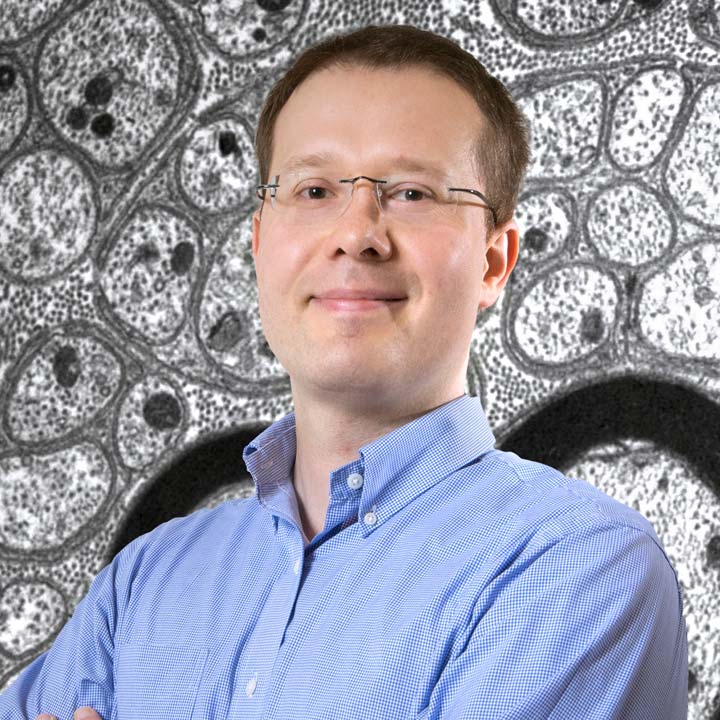 Dr. Beirowski received his medical degree from the University of Cologne, Germany, in 2005. After several clinical internships and conducting experimental research in nephrology with Dr. O. Gross (University of Göttingen, Germany), he was recruited by the laboratory of Dr. Michael Coleman (University of Cambridge, UK) to work on projects on the molecular mechanisms of axon degeneration. Dr. Beirowski obtained his PhD degree from the University of Cambridge, UK, in 2010. He completed his postdoctoral research on axon-glia interactions in Dr. Jeffrey Milbrandt’s laboratory at Washington University School of Medicine, St. Louis, in 2014. His research was supported by a German Academy of Sciences Leopoldina Research Fellowship, European Molecular Biology Organization (EMBO) Long-term fellowship, and Muscular Dystrophy Association (MDA) Career Development Award. Dr. Beirowski established his independent laboratory supported by intra- and extramural funding in the Hunter James Kelly Research Institute in Buffalo, NY, in 2014, where he had the rewarding experience of teaching and mentoring mainly undergraduate students and engaging in outreach activities (e.g., doi: 10.3389/frym.2022.682179; doi: 10.3389/frym.2022.648963). Dr. Beirowski was excited to relocate to The Ohio State University's Wexner Medical Center in 2022.
Dr. Beirowski received his medical degree from the University of Cologne, Germany, in 2005. After several clinical internships and conducting experimental research in nephrology with Dr. O. Gross (University of Göttingen, Germany), he was recruited by the laboratory of Dr. Michael Coleman (University of Cambridge, UK) to work on projects on the molecular mechanisms of axon degeneration. Dr. Beirowski obtained his PhD degree from the University of Cambridge, UK, in 2010. He completed his postdoctoral research on axon-glia interactions in Dr. Jeffrey Milbrandt’s laboratory at Washington University School of Medicine, St. Louis, in 2014. His research was supported by a German Academy of Sciences Leopoldina Research Fellowship, European Molecular Biology Organization (EMBO) Long-term fellowship, and Muscular Dystrophy Association (MDA) Career Development Award. Dr. Beirowski established his independent laboratory supported by intra- and extramural funding in the Hunter James Kelly Research Institute in Buffalo, NY, in 2014, where he had the rewarding experience of teaching and mentoring mainly undergraduate students and engaging in outreach activities (e.g., doi: 10.3389/frym.2022.682179; doi: 10.3389/frym.2022.648963). Dr. Beirowski was excited to relocate to The Ohio State University's Wexner Medical Center in 2022.
Research Interests
Long axons and their associated glia form the largest component of the neuronal network in the nervous system. Axon degeneration (AxD) and pathological glial alterations are an etiological hallmark of many neurodegenerative conditions. Protecting axons and their glia is therefore an important therapeutic target. Using a multi-disciplinary approach, our laboratory investigates the intriguing concept that the interplay between axonal and glial energy metabolism plays a central role in the regulation of axon integrity (e.g., Nature Neuroscience PMID 32807950 and 25195104). Our overarching and long-term research goal is to elucidate the relationship of axonal bioenergetics and glial metabolism (axoglial metabolic coupling). We aim to identify specific metabolic functions of axon-flanking glia that are important for the support of axons under physiological and injury conditions. The knowledge gained from these studies has the potential for the design of novel treatment strategies for many neurodegenerative diseases that are associated with early AxD, and in which AxD results in the most prominent and irreversible symptoms.
Clinical Interests
- Neuromuscular conditions
Education
- Postdoctoral training: Washington University School of Medicine, Department of Genetics, St. Louis, USA
- PhD: Molecular Biology, University of Cambridge, Cambridge, UK
- Residency: University of Cologne, University of Goettingen, Germany
- MD: University of Cologne, Cologne, Germany
Editorial Boards
- Associate Editor, Frontiers in Neuroscience, Section Neurodegeneration
- Editorial Board Member, Neural Regeneration Research
- Editorial Board Member, Nutrients
Other Editorial Activities
Ad hoc reviewer for Nature, Nature Neuroscience, Nature Aging, Nature Communications, Journal of Experimental Medicine, Cell Reports, Journal of Neuroinflammation, eLife, PLOS Biology, Science Signaling, Neurotherapeutics, Neurobiology of Disease, Glia, BMC Biology, Journal of Neuroscience, Molecular Neurobiology, Frontiers in Molecular Neuroscience, Frontiers in Cellular Neuroscience, Frontiers in Neuroscience, Journal of Neurochemistry, Nutrients, Molecular and Cellular Neuroscience, Biomolecules, Experimental Neurology, Brain Communications, Neuropharmacology, Scientific Reports, Neural Regeneration Research, International Journal for Molecular Sciences, Cellular and Molecular Neurobiology, Neuroendocrinology, PLOS One, Journal of Biomolecular Structure & Dynamics, Journal of Anatomy, Molecular Biology Reports, ISRN Neuroscience, BBA Molecular Basis of Disease, FEBS Letters, Neuroscience Letters, JoVE, Current Drug Research Reviews, Cell Biochemistry and Biophysics
Honors and Awards
- Young IBRO Regions Connecting Award, 2019
- MDA Career Development Award, 2012
- EMBO Long-term Fellowship Award, 2010
- German Academy of Sciences Leopoldina Fellowship Award, 2005
- BBSRC DTA Studentship Award, 2005
- Summa cum laude doctorate, University of Cologne, 2005
- 'Cologne Fortune' Student Fellowship, University of Cologne, 2004
Grants and Projects
- Augmenting axon resilience to physiologic stress through axoglial metabolic coupling.
The goal of this project is to elucidate the fundamental principles as to how axons withstand naturally occurring stress and maintain their function through non-cell autonomous metabolic support by their adjacent Schwann cell glia. NIH application in process - Energizing and protecting axons through metabolic coupling to Schwann cells.
The goal of this project is to examine how manipulation of metabolic coupling to Schwann cells regulate bioenergetic parameters of injured axons undergoing Wallerian degeneration and axons perturbed by chemotherapy treatment. Supported by NIH grant R01NS123450 - Elucidating the trophic support of long axons by metabolic signaling in oligodendrocytes.
The goal of this project is to study the molecular mechanisms as to how the LKB1-AMPK pathway in oligodendrocytes promotes axon stability. Supported by NIH grant R01NS111024. - Deciphering metabolic support of axons by LKB1 signaling in Schwann cells.
The goal of this project is to identify metabolic pathways in Schwann cells that are important for the regulation of axon integrity. Supported by MDA USA grant 577844.
